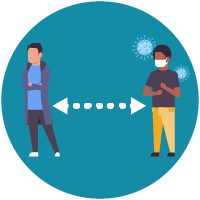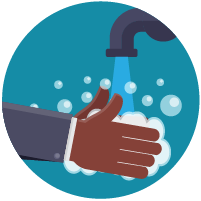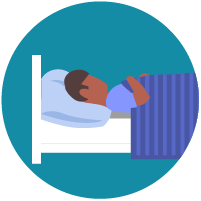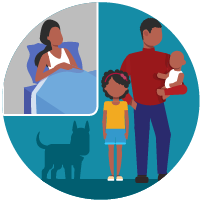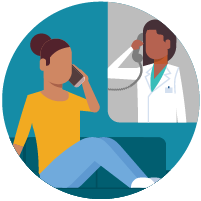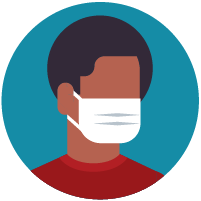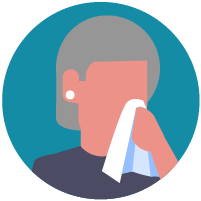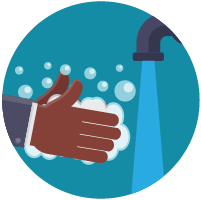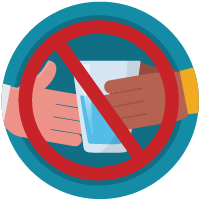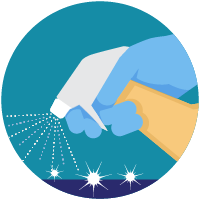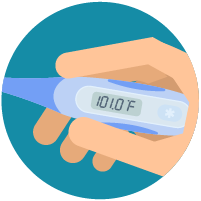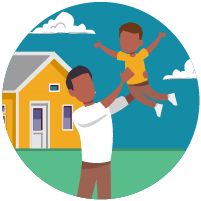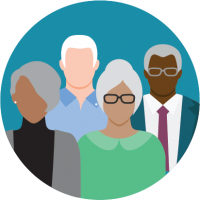
FREE NURSE ADVICE LINE
If you are at higher risk for serious illness from COVID-19 because of your age or because you have a serious long-term health problem, it is extra important for you to take actions to reduce your risk of getting sick with the disease.
Everyday precautions :
Avoid close contact with people who are sick.
- Wash your hands often with soap and water for at least 20 seconds, especially after blowing your nose, coughing, or sneezing, or having been in a public place.
- If soap and water are not available, use a hand sanitizer that contains at least 60% alcohol.
- To the extent possible, avoid touching high-touch surfaces in public places – elevator buttons, door handles, handrails, handshaking with people, etc. Use a tissue or your sleeve to cover your hand or finger if you must touch something.
- Wash your hands after touching surfaces in public places.
- Avoid touching your face, nose, eyes, etc.
- Clean and disinfect your home to remove germs: practice routine cleaning of frequently touched surfaces (for example: tables, doorknobs, light switches, handles, desks, toilets, faucets, sinks & cell phones)
- Avoid crowds, especially in poorly ventilated spaces. Your risk of exposure to respiratory viruses like COVID-19 may increase in crowded, closed-in settings with little air circulation if there are people in the crowd who are sick.
- Avoid all non-essential travel including plane trips, and especially avoid embarking on cruise ships.
Have supplies on hand:
- Contact your healthcare provider to ask about obtaining extra necessary medications to have on hand in case there is an outbreak of COVID-19 in your community and you need to stay home for a prolonged period of time.
- If you cannot get extra medications, consider using mail-order for medications.
- Be sure you have over-the-counter medicines and medical supplies (tissues, etc.) to treat fever and other symptoms. Most people will be able to recover from COVID-19 at home.
- Have enough household items and groceries on hand so that you will be prepared to stay at home for a period of time.
Content source: https://www.cdc.gov/coronavirus/2019-ncov
Watch for symptoms
Reported illnesses have ranged from mild symptoms to severe illness and death for confirmed coronavirus disease 2019 (COVID-19) cases.
The following symptoms may appear 2-14 days after exposure.*
- Fever
- Cough
- Shortness of breath
*This is based on what has been seen previously as the incubation period of MERS-CoV viruses.
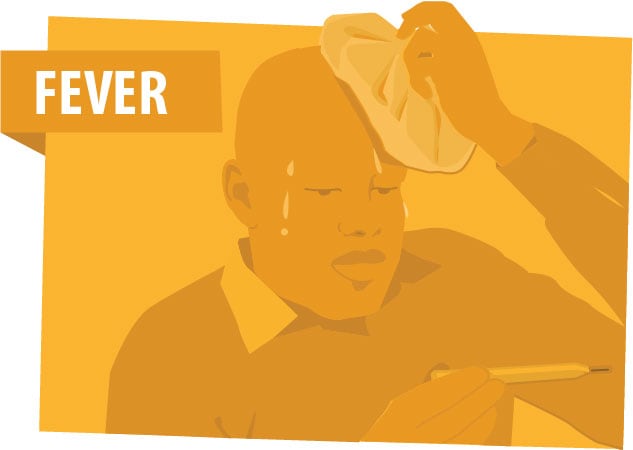
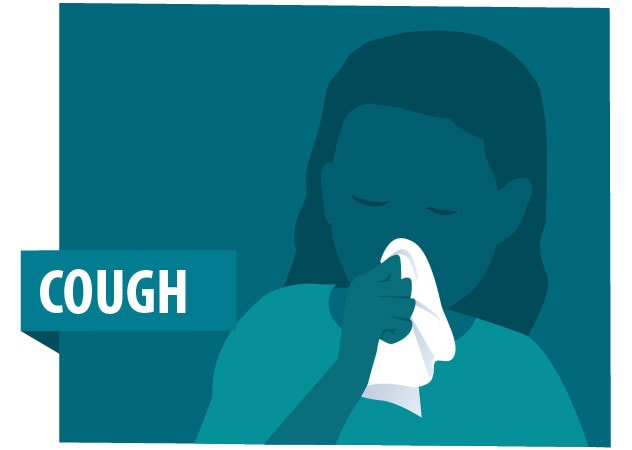
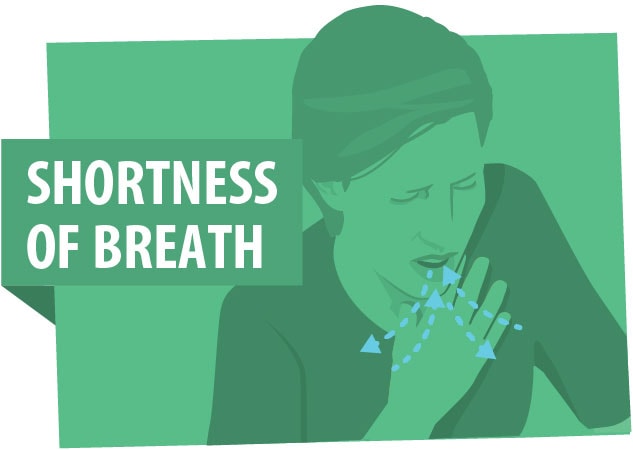
If you develop emergency warning signs for COVID-19 get medical attention immediately. Emergency warning signs include*:
- Difficulty breathing or shortness of breath
- Persistent pain or pressure in the chest
- New confusion or inability to arouse
- Bluish lips or face
*This list is not all inclusive. Please consult your medical provider for any other symptoms that are severe or concerning.
Content source: https://www.cdc.gov/coronavirus/2019-ncov
Follow the steps below: If you are sick with COVID-19 or suspect you are infected with the virus that causes COVID-19, follow the steps below to help prevent the disease from spreading to people in your home and community.
Stay home except to get medical care
- Stay home: People who are mildly ill with COVID-19 are able to isolate at home during their illness. You should restrict activities outside your home, except for getting medical care.
- Avoid public areas: Do not go to work, school, or public areas.
- Avoid public transportation: Avoid using public transportation, ride-sharing, or taxis.
Separate yourself from other people and animals in your home
- Stay away from others: As much as possible, you should stay in a specific room and away from other people in your home. Also, you should use a separate bathroom, if available.
- Limit contact with pets & animals: You should restrict contact with pets and other animals while you are sick with COVID-19, just like you would around other people. Although there have not been reports of pets or other animals becoming sick with COVID-19, it is still recommended that people sick with COVID-19 limit contact with animals until more information is known about the virus.
- When possible, have another member of your household care for your animals while you are sick. If you are sick with COVID-19, avoid contact with your pet, including petting, snuggling, being kissed or licked, and sharing food. If you must care for your pet or be around animals while you are sick, wash your hands before and after you interact with pets and wear a facemask. See COVID-19 and Animals for more information.
Call ahead before visiting your doctor
- Call ahead: If you have a medical appointment, call the healthcare provider and tell them that you have or may have COVID-19. This will help the healthcare provider’s office take steps to keep other people from getting infected or exposed.
Wear a facemask if you are sick
- If you are sick: You should wear a facemask when you are around other people (e.g., sharing a room or vehicle) or pets and before you enter a healthcare provider’s office.
- If you are caring for others: If the person who is sick is not able to wear a facemask (for example, because it causes trouble breathing), then people who live with the person who is sick should not stay in the same room with them, or they should wear a facemask if they enter a room with the person who is sick.
Cover your coughs and sneezes
- Cover: Cover your mouth and nose with a tissue when you cough or sneeze.
- Dispose: Throw used tissues in a lined trash can.
- Wash hands: Immediately wash your hands with soap and water for at least 20 seconds or, if soap and water are not available, clean your hands with an alcohol-based hand sanitizer that contains at least 60% alcohol.
Clean your hands often
- Wash hands: Wash your hands often with soap and water for at least 20 seconds, especially after blowing your nose, coughing, or sneezing; going to the bathroom; and before eating or preparing food.
- Hand sanitizer: If soap and water are not readily available, use an alcohol-based hand sanitizer with at least 60% alcohol, covering all surfaces of your hands and rubbing them together until they feel dry.
- Soap and water: Soap and water are the best option if hands are visibly dirty.
- Avoid touching: Avoid touching your eyes, nose, and mouth with unwashed hands.
- Do not share: You should not share dishes, drinking glasses, cups, eating utensils, towels, or bedding with other people or pets in your home.
- Wash thoroughly after use: After using these items, they should be washed thoroughly with soap and water.
Clean all “high-touch” surfaces everyday
- Clean and disinfect: Practice routine cleaning of high touch surfaces.
High touch surfaces include counters, tabletops, doorknobs, bathroom fixtures, toilets, phones, keyboards, tablets, and bedside tables.
- Disinfect areas with bodily fluids: Also, clean any surfaces that may have blood, stool, or body fluids on them.
- Household cleaners: Use a household cleaning spray or wipe, according to the label instructions. Labels contain instructions for safe and effective use of the cleaning product including precautions you should take when applying the product, such as wearing gloves and making sure you have good ventilation during use of the product.
Monitor your symptoms
- Seek medical attention: Seek prompt medical attention if your illness is worsening (e.g., difficulty breathing).
- Call your doctor: Before seeking care, call your healthcare provider and tell them that you have, or are being evaluated for, COVID-19.
- Wear a facemask when sick: Put on a facemask before you enter the facility. These steps will help the healthcare provider’s office to keep other people in the office or waiting room from getting infected or exposed.
- Alert health department: Ask your healthcare provider to call the local or state health department. Persons who are placed under active monitoring or facilitated self-monitoring should follow instructions provided by their local health department or occupational health professionals, as appropriate.
Call 911 if you have a medical emergency: If you have a medical emergency and need to call 911, notify the dispatch personnel that you have, or are being evaluated for COVID-19. If possible, put on a facemask before emergency medical services arrive.
When to Discontinue home isolation
- Stay at home until instructed to leave: Patients with confirmed COVID-19 should remain under home isolation precautions until the risk of secondary transmission to others is thought to be low.
- Talk to your healthcare provider: The decision to discontinue home isolation precautions should be made on a case-by-case basis, in consultation with healthcare providers and state and local health departments.
Footnote
1Fever may be subjective or confirmed
- a) being within approximately 6 feet (2 meters) of a COVID-19 case for a prolonged period of time; close contact can occur while caring for, living with, visiting, or sharing a health care waiting area or room with a COVID-19 case
– or –
- b) having direct contact with infectious secretions of a COVID-19 case (e.g., being coughed on)
Content source: https://www.cdc.gov/coronavirus/2019-ncov
Who is at higher risk?
- Older adults
- People who have serious chronic medical conditions like:
- Heart disease
- Diabetes
- Lung disease
What others can do to support older adults:
- Community preparedness planning for COVID-19 should include older adults and people with disabilities, and the organizations that support them in their communities, to ensure their needs are taken into consideration.
- Many of these individuals live in the community, and many depend on services and supports provided in their homes or in the community to maintain their health and independence.
- Long-term care facilities should be vigilant to prevent the introduction and spread of COVID-19. Information for long-term care facilities can be found here.
Family and caregiver support
- Know what medications your loved one is taking and see if you can help them have extra on hand.
- Monitor food and other medical supplies (oxygen, incontinence, dialysis, wound care) needed and create a back-up plan.
- Stock up on non-perishable food to have on hand in your home to minimize trips to stores.
- If you care for a loved one living in a care facility, monitor the situation, ask about the health of the other residents frequently and know the protocol if there is an outbreak.
Content source: https://www.cdc.gov/coronavirus/2019-ncov
COVID-19 tests are available in Tillamook County;
However, due to high demand and limited supplies for these tests, we are following CDC and OHA assessment guidelines.
We contract with LabCorp to perform the COVID-19 lab test. The cost of the COVID-19 test is $51.31 for self-pay and may be adjusted if you qualify for a reduced sliding fee discount.
Call our COVID-19 nurse line 503-842-3940, Monday – Friday 8 am – 5pm through this medical screening process and provider clinical judgement, we will determine whether you need a medical appointment which may occur at our mobile clinic.
The mobile clinic will be stationed in the parking lot of the Community Health Center clinic located at 801 Pacific Ave, Tillamook.
Read more about testing here
Fourth Case of COVID-19 Reported in Tillamook County
Our Heroes – COVID-19
Oregon Guidance on Use of Homemade Masks or Face Coverings by the Public to Prevent Spread of COVID-19
Tillamook County partners with YMCA to coordinate donations and operate a hotline
Third Case of COVID-19 Reported in Tillamook County
Tillamook County – Essential or Non-Essential? The Mental Health Impact
First Presumptive Case of COVID-19 Reported in Tillamook County
Governor Kate Brown’s Executive Order: Stay Home Except for Essential Needs
March 22, 2020 Tillamook Board of Commissioners Update – Resolution #R20-006
Oregon reports 26 new COVID-19 cases
Governor Kate Brown Extends Statewide School Closure Until April 28, Releases Executive Orders
TILLAMOOK COUNTY PARKS DEPARTMENT CLOSURE
State Announces 8 New COVID-19 Cases

